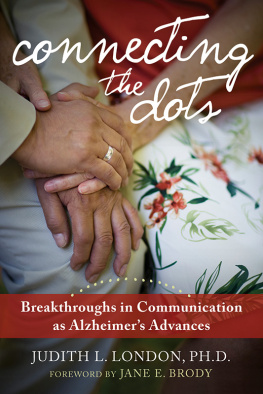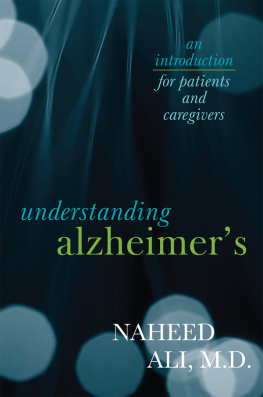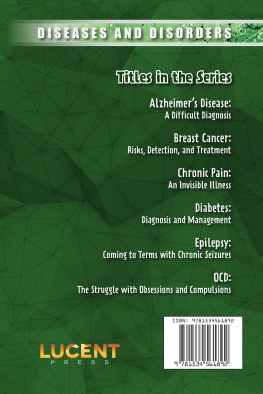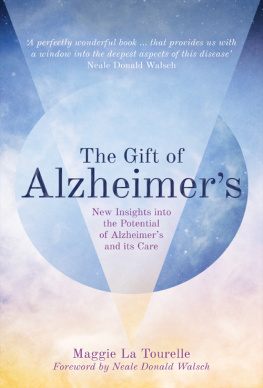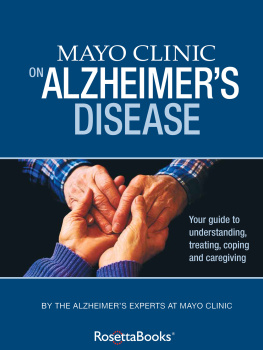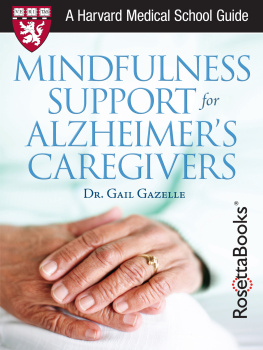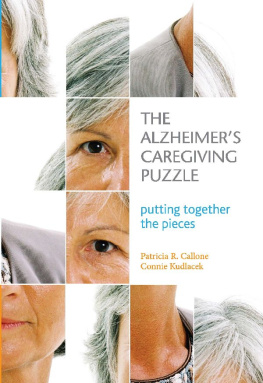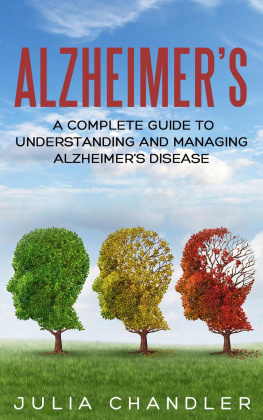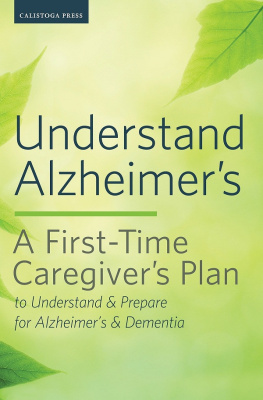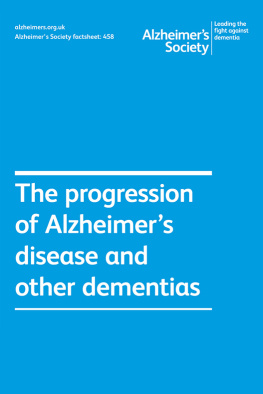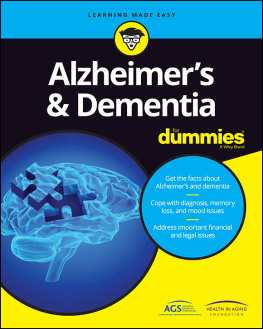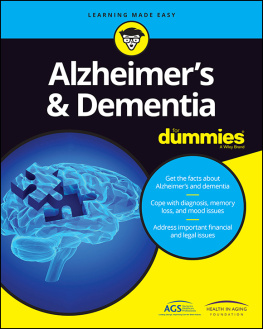Acknowledgments
How does one thank all the extraordinary people who provided me with the inspiration, guidance, feedback, and support to make this book a reality?
For starters, my patients with advancing Alzheimers taught me what I needed to know in order to write this book to tell you that your loved one has plenty to say.
Dr. Frima Christopher taught me that group therapy works for everyone, even those with dementia.
Without the encouragement and mentoring of my good friend Barbara Garshman, former director of development at NBC and a writer herself, I could not have undertaken this project.
My colleague and friend Dr. Kathy Kermit gave me sound professional advice. Joan Anway pointed out pertinent details.
All the people in my writing groups and my instructors, Sylvia Halloran and then Terry Galanoy, supplied valuable feedback. A special thanks to Terry, an accomplished author plus teacher par excellence.
Jan Davis launched me with a publicity piece that led to my finding the wonderful people at New Harbinger, especially my editor, Melissa Kirk, and copy editor, Kayla Sussell.
My family graciously tolerated me, but Bob Davis displayed never-ending patience, listening to me read and reread every one of innumerable versions of the book.
They all made it simple for me.
Appendix
Appx: The Tools: A Summary
Here is a list that summarizes the tools. The second list repeats each tool with related comments. The first six tools are the basis for any connection with a person who has Alzheimers disease.
Brief Summary of Tools
- AttitudeTreat Your Loved One as a Precious Human Being
- Show Empathy
- Use What You Know to Go with the Flow
- Agree
- Have Hope and Express Love
- Make Sure You Can Be Heard and Seen
- Dont Take an Unkind Remark Too Seriously
- Be Open
- Use Your Loved Ones Repetitions to Connect
- Deal with Accusations
- Use Foods to Awaken Memory
- Some Openers to Use with Men
- Acknowledge Loss
- Use Meaningful Photographs to Relate
- Use Art as a Way to Relate
- Use Singing and Music to Connect
- Set Up the Same Seating Location to Jog Memory
- Use Prayer if Its Appropriate
- Theres Not Always a Simple Answer for a Change in Attitude
- Be Persistent but Respectful
- Assume That Your Loved One Can Understand
- Check for Signs of Depression
- Avoid Confrontation
- Use the Delusion
- Self-Image Counts
- Capitalize on Remaining Social Skills
- Be Reassuring
- Consider Your Loved Ones Native Language
- Be Prepared for Nonrecognition
- Expect That Some Things Are Remembered
- Learn from Your Loved One
- Let Her Do What She Still Can Do
- Do Not Underestimate Feelings About Saying Good-Bye
The Tools with Related Comments
Tool 1: AttitudeTreat Your Loved One as a Precious Human Being
- Smile.
- Always introduce yourself and greet your loved one by name every time you meet.
- Position yourself face-to-face or catty-corner on the same physical plane to establish eye contact.
- Use an inviting tone.
- Be kind.
- Be considerate.
- Speak slowly.
- Use gestures as you speak.
- Ask simple but open-ended questions.
- Be patient. Allow time for responses.
- Believe that your efforts may pay off.
Tool 2: Show Empathy
- Put yourself in her shoes to figure out what she may be thinking and feeling.
- Use your intuition about what you think she is saying and feeling. Connect the fragments and see if she agrees.
- Remember that your loved one is a person with dementia, not a demented person.
- Listen.
Tool 3: Use What You Know to Go with the Flow
- Use what you know about the person to understand what is being said.
- Acknowledge his reality by repeating his statement back to him and expanding on what he said.
- Go with the flow of your loved ones remarks by following up on what he said.
- Talk about memories from a long time ago since they are the last to fade.
- Dont expect him to remember your previous conversation.
- Remember that he lives in the present moment.
- View each time you meet as an entirely new occasion.
Tool 4: Agree
- Dont disagree or argue.
- Acknowledge the thoughts and feelings behind the message.
- Validate what you hear.
Tool 5: Have Hope and Express Love
- Express love and support as often as possible and your loved one may reciprocate.
- Focus on what remains, not what is gone.
- Accept her as she is.
Tool 6: Make Sure You Can Be Heard and Seen
- Always have a hearing amplifier with you, even if your loved one refuses to wear it. An amplifier can be purchased at a general electronics store.
- Reoffer the use of a hearing amplifier every time you want to communicate.
- Be prepared to repeat what you say and, if you are not alone, what others say.
- Place yourself eye to eye so that you can be seen.
Tool 7: Dont Take an Unkind Remark Too Seriously
- Have a sense of humor even when insensitive, possibly true, remarks are made.
- Try not to take it personally, even though the comments might hurt. If you feel very hurt, let him know by simply saying something like, Ouch. That hurt.
Tool 8: Be Open
- Expect your loved ones mood to change without any warning, and dont be dismayed when this happens.
- Assume he understands, have no expectations that he will respond, and you may be pleasantly surprised.
Tool 9: Use Your Loved Ones Repetitions to Connect
- Constant repetition is an opportunity to communicate.
- Delve beneath the statements to find meaning.
- Ask her opinion about any issue that is brought up.
- Connect the fragments to help her express herself.
Tool 10: Deal with Accusations
- Acknowledge that an item is not there or validate his perception that something is wrong. Be sympathetic.
- Offer to help find what is missing or to straighten out the situation.
- Apologize if your loved one says that you did something wrong.
- Once again, dont take it personally.
Tool 11: Use Foods to Awaken Memory
- Offer your loved one a favorite food or a nonalcoholic drink.
- Use food as a springboard to awaken memory and pleasant sensations.
Tool 12: Some Openers to Use with Men
- Introduce news about sports or other current events as a way to communicate.
- Again, restate what you hear.
- Listen to a joke and laugh, no matter many times youve heard it before.
- A sense of humor endures for a long time. Have fun laughing together.
Tool 13: Acknowledge Loss
- Acknowledge and discuss any kind of loss.
- Talk about your loved ones parents in order to stimulate conversation and promote healing, asking questions such as, What was your mother like?
- Acknowledge and explore feelings, even the sad ones, whether or not he realizes that the relative is gone.
Tool 14: Use Meaningful Photographs to Relate
- Use photographs and make comments to stimulate memory and to relate.
- Say something about the photograph.
- Explore your loved ones responses.
Tool 15: Use Art as a Way to Relate
- Create art with your loved one to inspire self-expression and connection.

